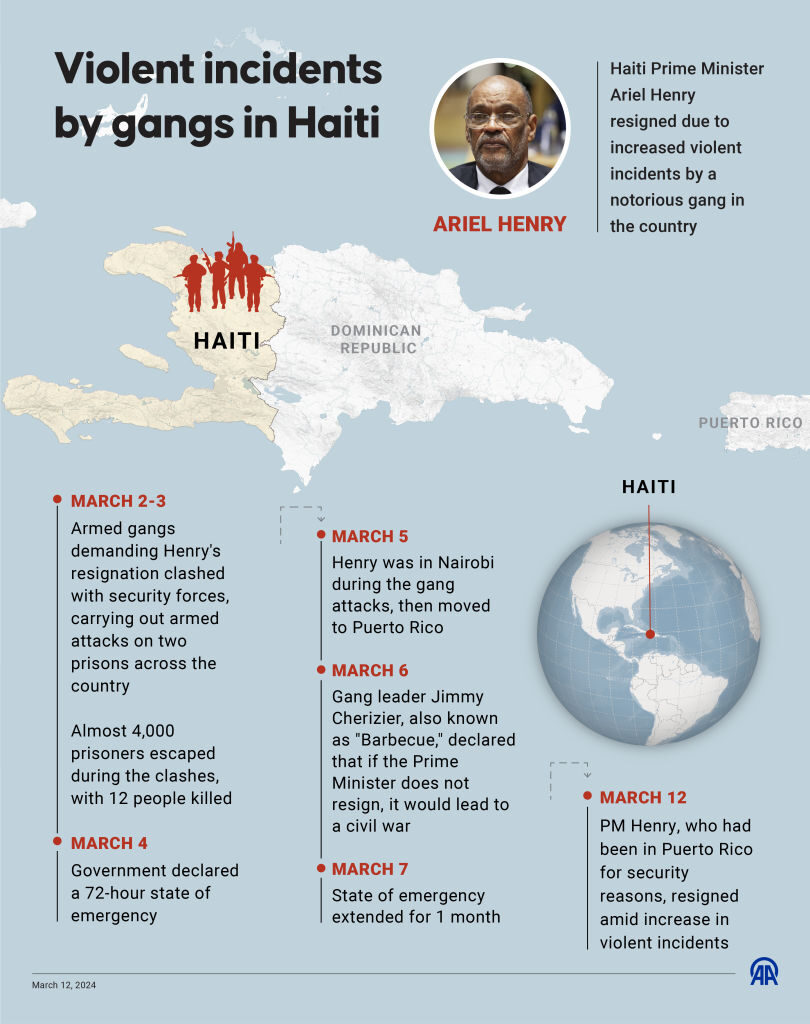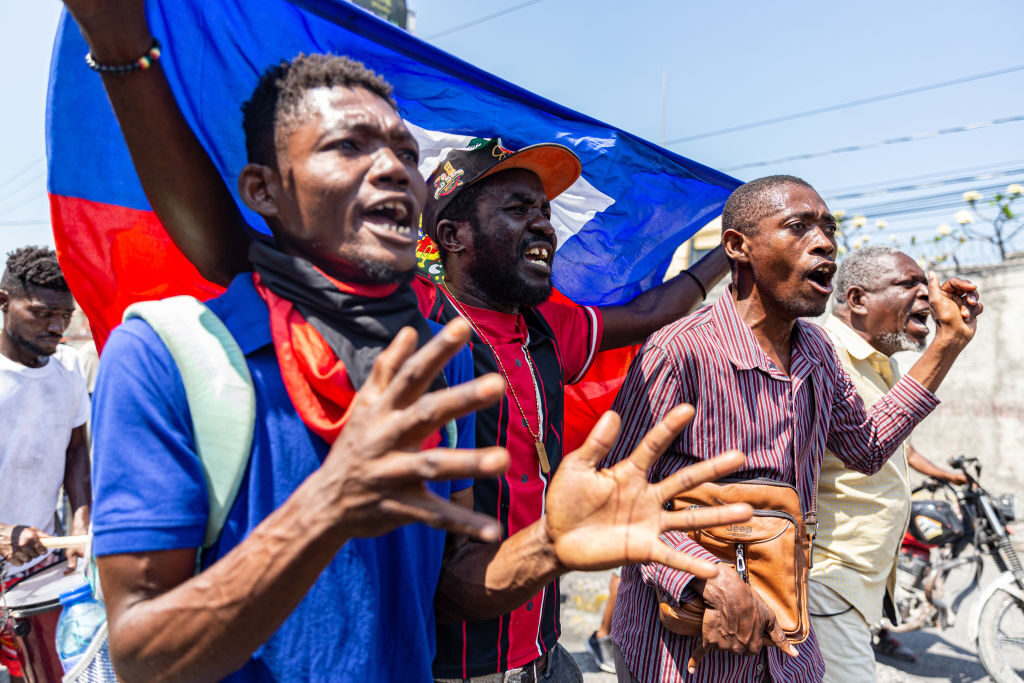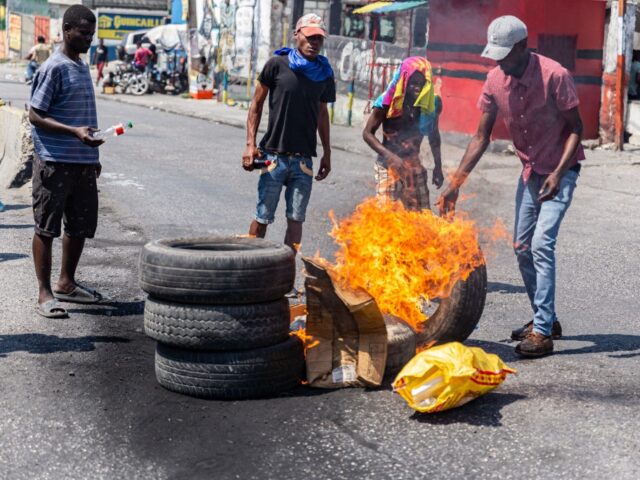The government of Kenya temporarily backed out of sending its police officers to Haiti to help quell out-of-control gang violence in the country, stating on Tuesday that the lack of a coherent government to approve the deployment in Port-au-Prince gives the plan “no anchor.”
Kenyan President William Ruto welcomed outgoing Haitian Prime Minister Ariel Henry in early March to sign a deal in which Nairobi agreed to send its national police into Haiti to help the government there wrestle control of the country out of the hands of organized criminal gangs, the largest coalition of which is led by former police officer Jimmy “Barbecue” Cherizier. Cherizier has threatened to plunge the country into “genocide” and declared a “bloody revolution” this week.
The agreement is unpopular in Kenya, where opposition politicians have vowed legal action to prevent Ruto from sending Kenyan police officers into a turbulent situation abroad and courts have ruled the move unconstitutional.
The Kenyan police deployment is imagined as part of a U.N.-approved “Multinational Security Support (MSS)” mission to Haiti, largely funded by the United States. Secretary of State Antony Blinken confirmed this week that America would invest $300 million in the success of the MSS.
Following Henry’s flight to Kenya, Cherizier’s gangs organized a massive prison break that put an estimated 4,000 criminals back on the streets. The militias overran the capital and surrounded the airport, making it impossible for Henry to return. Henry is currently believed to be in Puerto Rico, where he announced he would resign on Monday following the appointment of a “Presidential Transitional Council” tasked with organizing elections and restoring order.
Henry’s resignation announcement made the deployment of Kenyan police impossible for the moment, Kenyan Foreign Affairs Principal Secretary Korir Sing’oei reportedly said on Tuesday.

An infographic titled ‘Violent incidents by gangs in Haiti’. Haiti Prime Minister Ariel Henry resigned due to increased violent incidents by a notorious gang in the country. (Muhammed Ali Yigit/Anadolu via Getty Images)
“There has been a fundamental change in circumstances as a result of the resignation of the PM,” Kenya’s Daily Nation quoted Sing’oei as saying.
“Without a political administration in Haiti, there is no anchor on which a police deployment can rest, hence Government (of Kenya) will await the installation of a new constitutional authority in Haiti,” the official explained, “before taking further decisions on the matter. Kenya reiterates commitment to providing leadership to the MSS.”
The Haitian outlet Le Nouvelliste quoted other Kenyan officials as saying that deploying police is impossible if Haiti does not have a government. Haiti has not had a president since 2021, when then-President Jovenel Moïse was assassinated at gunpoint in his own home. Moïse had appointed Henry prime minister less than a week before his death and Henry has refused to organize elections in the country so far on the grounds that the security situation in Haiti made it impossible to hold such an event.
“We cannot deploy the police on the streets of Port-au-Prince without an administration in place,” Le Nouvelliste quoted Kenyan Foreign Ministry spokesman Salim Swaleh as saying. Swaleh reportedly emphasized, however, that the agreement to deploy police “still stands.”
The U.S. State Department has been among the most vocal entities urging a rapid deployment of the MSS. During a briefing for reporters on Tuesday, a senior State Department official insisted that the “legal framework for the deployment” of Kenyan police officers remained active and pressed for that deployment immediately, if possible.
“And in our conversations with Kenyan officials, we’ve stressed the – I think on both sides have stressed the importance of moving to deploy as quickly as practicable,” the unnamed official said. “But we remain confident that the mission will go forward and that – in all the conversations we’ve had, Kenyan officials have said that they intend to go forward and they intend to lead this mission.”

Some people reacted during a demonstration against CARICOM for the decision following the resignation of Haitian Prime Minister Ariel Henry as representatives of the Caribbean Community (CARICOM) and Haitian actors made an agreement for political transition in Haiti it a historic decision that was made by the formation of a seven-member Presidential Council (CP), and the Haitian government on Tuesday extended the night-time curfew and state of emergency in the capital of Port-au-Prince for a month amid a wave of violence triggered by armed groups in Port-au-Prince, Haiti, on March 12, 2024. (Photo by Guerinault Louis/Anadolu via Getty Images)
The senior official also claimed that the ongoing Russian invasion of Ukraine, among other international “global crises,” is complicating the response to the chaos in Haiti.
“The challenge at this moment is this is a time of unprecedented global crises; the ongoing conflict in Ukraine provoked by Russia’s further invasion,” the official said, “the incredibly challenging humanitarian situation in Gaza have meant that donors are stretched. So the donor community really is facing an unprecedented level of requirements on them.”
It is unclear when the Presidential Transitional Council will form, or who will be on it. Some reports suggest that what remains of the Haitian government is seeking to form the Council within 48 hours, which would allow Kenya to reconsider its deployment within this week. The Council will reportedly require Haiti’s largest political parties to agree on representatives for each, as well as members of the religious community and “civil society.”
Cherizier has vowed to continue organizing mass violence beyond Henry’s resignation. Prior to Henry’s announcement, Cherizier said that his remaining in the prime ministership would result in Haiti “heading straight for a civil war that will lead to genocide.” Speaking to ABC News later in the week, however, Cherizier described Henry’s departure as merely the “first step” in his total destruction of the government of Haiti.
“The first step is to overthrow Ariel Henry and then we will start the real fight against the current system, the system of corrupt oligarchs and corrupt traditional politicians,” he explained. “Not only are we fighting against Ariel Henry, but we are also fighting against everyone who has some complicity.”

COMMENTS
Please let us know if you're having issues with commenting.